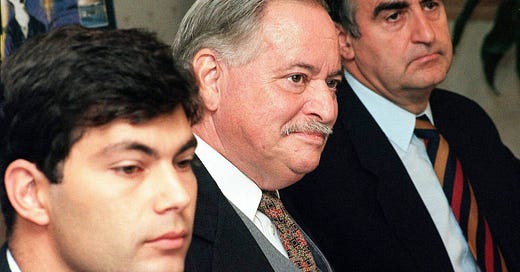I’ve been thinking this for a while, but I haven’t written it down. We may be only a couple of years away from a national-unity crisis.
And the dwindling number of people with a working memory of the last crisis have retained instincts that will be useless if there’s another one. Any future Quebec sovereignty referendum campaign would be unrecognizably different from the first two, more chaotic and inherently unpredictable.
I’ve been doing some public speaking in Quebec lately, and it’s pretty clear from the Q&A sessions that even many francophone Quebecers haven’t thought through the ways in which a future sovereignty referendum might play out. So it’s time to start contemplating ghosts of Christmas yet to come.
The Trudeau Liberals aren’t the only political party in Canada that’s fallen and can’t get up. It’s looking grim for Quebec’s governing Coalition Avenir Québec too: Wednesday’s monthly Léger poll was the worst for Quebec’s governing party in eight years. Premier François Legault, who sailed to re-election in 2022 on the general impression that he had a unique sightline into the heart of the average Quebecer, has lumbered from crisis to crisis ever since. It’s rough when a leader whose intuition is his brand loses his touch.
What might make all of this a national story is the identity of the challenger who’s settling into Poilievre-esque polling dominance: Paul Saint-Pierre Plamondon, the young leader of the Parti Québécois. Yes, that Parti Québécois.
Plamondon can be a charming and agile political performer. His PQ is at 35% in the latest Léger, up three points from last month. Legault’s CAQ is at 24%, down three points. Liberals and the urban lefty francophone Québec Solidaire are under 20%. Checking the last Qc125 projection, we see these numbers suggest a solid PQ majority for the first time since — wow, since Lucien Bouchard’s only victory as PQ leader in 1998.
A new PQ leader would have the option — would, in fact, be under harsh pressure from his party members — to call a referendum on Quebec’s secession from Canada. Younger readers may be surprised to learn this has happened before, in 1980 and again in 1995. Forests have been felled and ink lakes drained to tell the tale of how those two campaigns went. Short version: Quebec’s still in Canada.
Support for sovereignty is at a relatively low 37% in the Léger poll, and it hasn’t risen in pace with the PQ’s increasing popularity. That makes it possible, perhaps even likely, that Saint-Pierre Plamondon could join a list of PQ leaders who’ve become premier but didn’t hold referendums — a list that includes Pierre Marc Johnson, Bouchard, Bernard Landry and Pauline Marois.
But the instruction manual for politics in the 21st century is a single page, on which is written, DON’T ASSUME THE BEST. On my list of no-referendum PQ premiers above, I note that Johnson, Bouchard and Landry simply inherited power from their predecessors. Marois had only a minority of seats in the National Assembly.
Based on a small sample — René Léveque, elected 1976, referendum 1980; Jacques Parizeau, elected 1994, referendum 1995 — we can propose this hypothesis: when the PQ takes power with a majority government after a long period in opposition, it holds a secession referendum.
Support for sovereignty was around 40% when Parizeau called the 1995 referendum. It climbed to nearly 50%.
So here’s a plausible future. A federal election a year from now produces a majority Conservative government led by Pierre Poilievre as prime minister. A Quebec election a year later, in 2026, produces a majority PQ government led by PSPP. He calls a referendum a year later on a relatively clear question.
Let’s consider the challenges for those who’d like Canada to continue with Quebec in it. The first one is obvious. The rest, based on my recent conversations in Quebec, apparently really aren’t.




